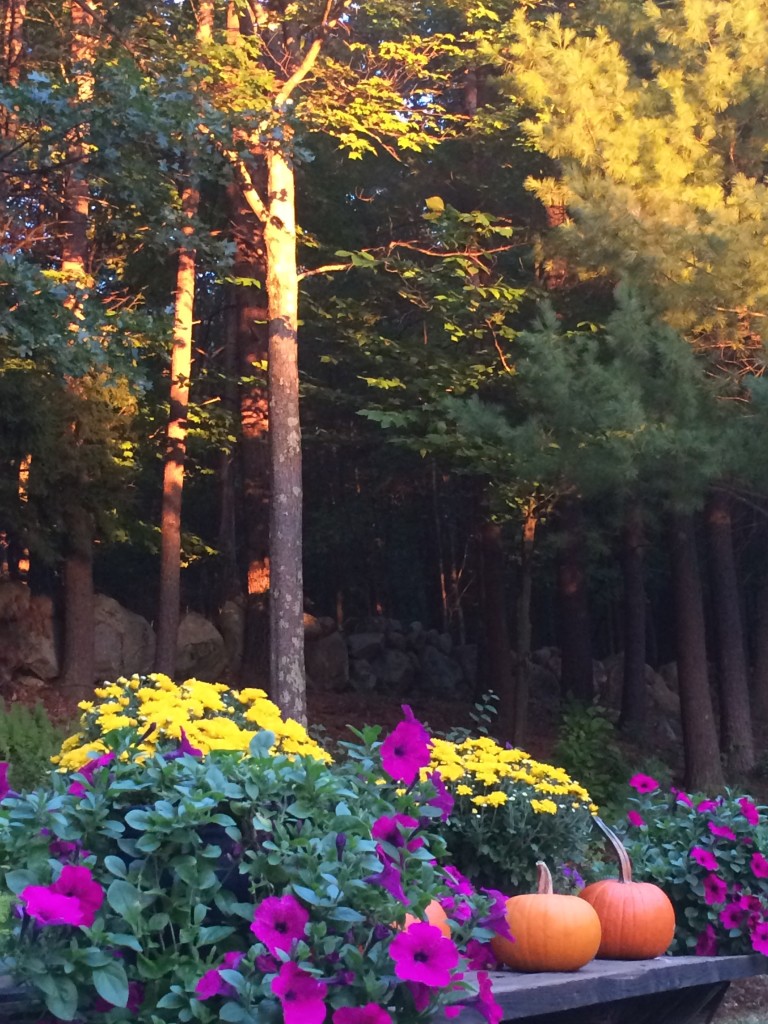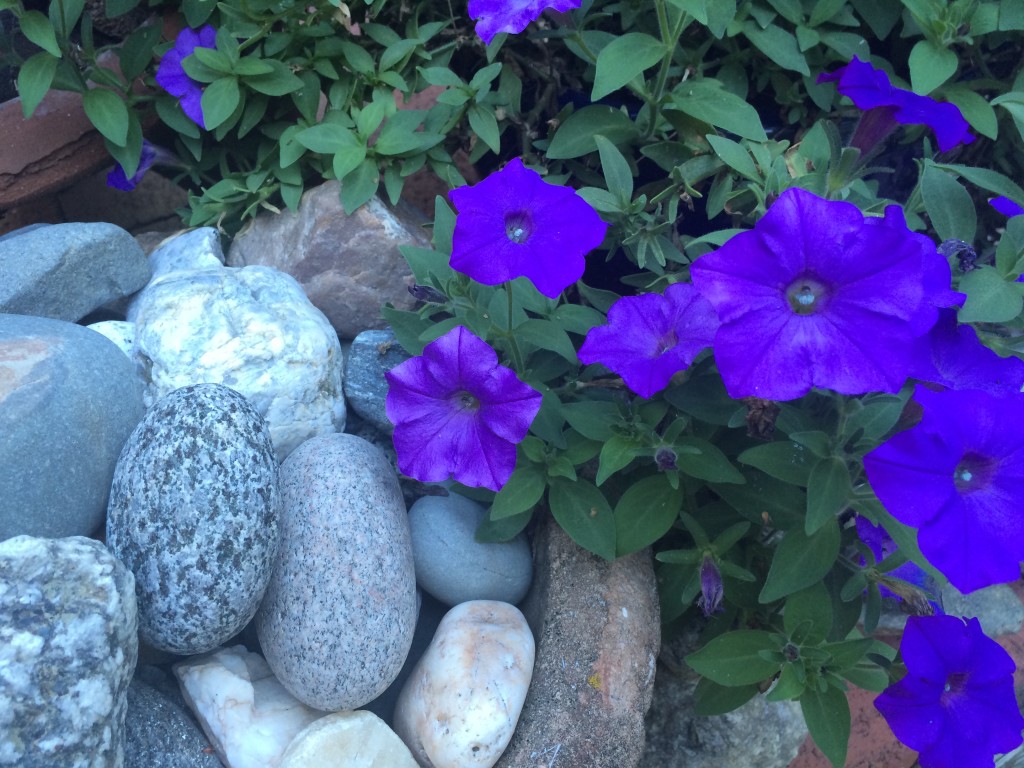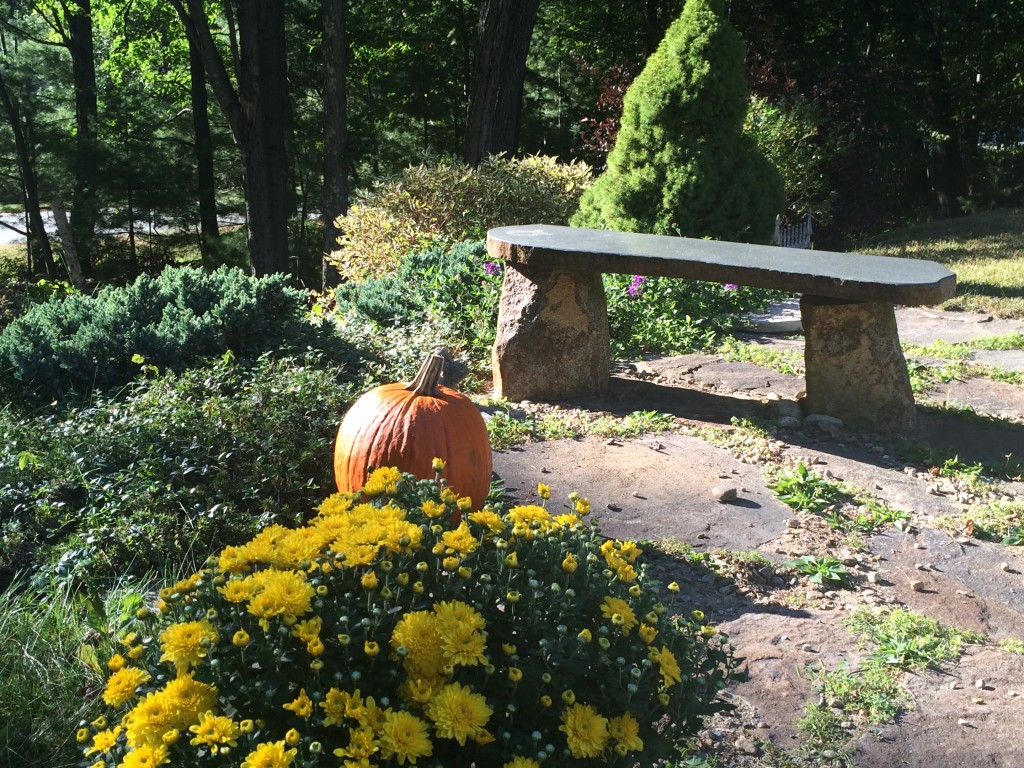 Yesterday was the first official day of Autumn, and it just so happened to be a picture perfect day where everything was “just right” – the soft blanket of blue sky, the sunny warm and still air, the full-blossomed, perfectly poised purple petunias. But “just right” never stays long – things change as nature, a “trustworthy guide”*, shows us season to season as we now watch the coming and going of summer to autumn. The turning of leaves into an exhilarating brilliance ends with a falling into a cooler, darker, and heavier season. The lightness, openness and warmth of summer has departed leaving behind the “meeker” chillier mornings that Emily Dickinson wrote about in her poem about autumn below:
Yesterday was the first official day of Autumn, and it just so happened to be a picture perfect day where everything was “just right” – the soft blanket of blue sky, the sunny warm and still air, the full-blossomed, perfectly poised purple petunias. But “just right” never stays long – things change as nature, a “trustworthy guide”*, shows us season to season as we now watch the coming and going of summer to autumn. The turning of leaves into an exhilarating brilliance ends with a falling into a cooler, darker, and heavier season. The lightness, openness and warmth of summer has departed leaving behind the “meeker” chillier mornings that Emily Dickinson wrote about in her poem about autumn below:
The morns are meeker than they were,
The nuts are getting brown;
The berry’s cheek is plumper,
The rose is out of town.
The maple wears a gayer scarf,
The field a scarlet gown.
Lest I should be old-fashioned,
I’ll put a trinket on.
The “trinket” that Emily Dickinson refers to at the end of her poem I believe speaks to the melancholy that is on the other side of autumn’s brilliance. This melancholy is what Parker J. Palmer writes so beautifully about in his piece “Autumn: A Season of Paradox” for OnBeing. He writes:
“Autumn is a season of exhilarating beauty. It’s also a season of steady decline and, for some of us, deepening melancholy. The days become shorter and colder, the trees shed their glory, and summer’s abundance starts to decay toward winter’s death.
I’m a professional melancholic, and for years my delight in the autumn color show quickly morphed into sadness as I watched the beauty die. Focused on the browning of summer’s green growth, I allowed the prospect of death to eclipse all that’s life-giving about fall and its sensuous delights.”
Palmer goes on to write about the “paradox” of autumn in which there are opposites – “diminishment and beauty, darkness and light, death and life…” He believes that these opposites are “held together in the paradox of the ‘hidden wholeness’”, referencing the following quote by Thomas Merton*: “There is in all visible things….a hidden wholeness.”
It is in an understanding and acceptance of this paradox as “opposites (that) do not negate each; they cohabit and co-create in mysterious unity at the heart of reality”, that can help to move one beyond the melancholy of autumn to a more honest reality or what Palmer refers to as an “organic reality” where “autumn reminds me to celebrate the primal power that is forever making all things new in me, in us, and in the natural world.”
And so, as the leaves begin to turn, may we celebrate the glory of Autumn in all of its paradoxes. In fact, in the spirit of rebirth and renewal that is inherent in this brilliant and exhilarating season, I think I will put a trinket* on…
*The phrase “trustworthy guide” was taken from Parker J. Palmer’s piece.
*Trinket – a small inexpensive ornament. A bauble, trifle, knickknack, bead, charm, bagatelle, bibelot, token, memento, souvenir, keepsake.
*Thomas Merton (1915-1968) was a writer and Trappist Monk at a monastery in Kentucky.

